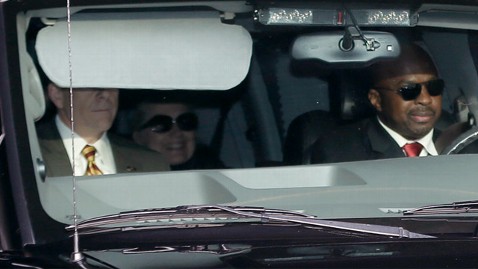The House of Representatives has approved a bipartisan Senate deal to avert the "fiscal cliff" and preserve Bush-era tax cuts for all Americans making less than $400,000 per year.
The compromise is now on its way to President Obama for his signature.
House Republicans agreed to the up-or-down vote Tuesday evening, despite earlier talk of trying to amend the Senate bill with more spending cuts before taking a vote. The bill delays for two months tough decisions about automatic spending cuts that were set to kick in Wednesday.
A majority of the Republicans in the GOP-majority House voted against the fiscal cliff deal. About twice as many Democrats voted in favor of the deal compared to Republicans. One hundred fifty-one Republicans joined 16 Democrats to vote against the deal, while 172 Democrats carried the vote along with 85 Republicans.
The Senate passed the same bill by an 89-8 vote in the wee hours of New Year's Day. If House Republicans had tweaked the legislation, there would have been no clear path for its return to the Senate before a new Congress is sworn in Thursday.
The vote split Republican leaders in the House. House Speaker John Boehner, R-Ohio, voted yes, and so did the GOP's 2012 vice presidential candidate, Rep. Paul Ryan, R-Wis.
But House Majority Leader Eric Cantor, R-Va., the No. 2 Republican in the House, voted no. It was his opposition that had made passage of the bill seem unlikely earlier in the day.
The deal does little to address the nation's long-term debt woes and does not entirely solve the problem of the "fiscal cliff."
Indeed, the last-minute compromise -- far short from a so-called grand bargain on deficit reduction -- sets up a new showdown on the same spending cuts in two months amplified by a brewing fight on how to raise the debt ceiling beyond $16.4 trillion. That new fiscal battle has the potential to eclipse the "fiscal cliff" in short order.
"Now the focus turns to spending," said Boehner in a statement after the vote. "The American people re-elected a Republican majority in the House, and we will use it in 2013 to hold the president accountable for the 'balanced' approach he promised, meaning significant spending cuts and reforms to the entitlement programs that are driving our country deeper and deeper into debt."
President Obama also seemed to be looking forward to the next debate.
Bill Clark/Roll Call/Getty Images
'Fiscal Cliff' Negotiations: Congress Reaches Agreement Watch Video
"This is one step in the broader effort to strengthen our economy for everybody," said Obama, who was joined by his top negotiator, Vice President Joe Biden, for late-night televised remarks after the House vote.
Obama lamented that earlier attempts at a much larger fiscal deal that would have cut spending and dealt with entitlement reforms failed. He said he hoped future debates would be done with "a little less drama, a little less brinksmanship, and not scare folks quite as much."
But Obama drew a line in the sand on the debt ceiling, which is set to be reached by March.
"While I will negotiate over many things, I will not have another debate with this Congress over whether they should pay the bills for what they've racked up," Obama said. "We can't not pay bills that we've already incurred."
Republicans hope that allowing the fiscal cliff compromise, which raised taxes without an equal amount of spending cuts, will settle the issue of tax rates for the coming debates on spending.
However, getting the deal done wasn't easy. Before deciding on the up-or-down vote in the House on the fiscal cliff deal, GOP leaders had emerged from a morning conference meeting disenchanted by the legislative package devised by Senate Minority Leader Mitch McConnell, R-Mo., and Vice President Biden early this morning, with several insisting they could not vote on it as it stood.
"I do not support the bill," Cantor said as he left the meeting. "We're looking for the best path forward. No decisions have been made yet."
Boehner refused to comment on the meeting, but his spokesman said, "The lack of spending cuts in the Senate bill was a universal concern amongst members in today's meeting."
As lawmakers wrestled with the legislation, the non-partisan Congressional Budget Office estimated that the bill's added spending combined with the cost of extending tax cuts for those making under $400,000 would actually add $3.9 trillion to the deficit over the next 10 years. The Joint Committee on Taxation reached a similar conclusion.
The impasse once again raised the specter of sweeping tax hikes on all Americans and deep spending cuts' taking effect later this week.
"This is all about time, and it's about time that we brought this to the floor," House Minority Leader Nancy Pelosi said after emerging from a meeting with Democrats.
"It was a bill that was passed in the U.S. Senate 89-8. Tell me when you've had that on a measure as controversial as this?" she said of the overwhelming vote.
Pelosi could not say, however, whether the measure had the backing of most House Democrats.
"Our members are making their decisions now," she said.
Biden joined Democrats for a midday meeting on Capitol Hill seeking to shore up support for the plan.
While Congress technically missed the midnight Dec. 31 deadline to avert the so-called cliff, both sides expressed eagerness to enact a post-facto fix before Americans went back to work and the stock market opened Wednesday.
"This may take a little while but, honestly, I would argue we should vote on it today," said Rep. Tom Cole, R-Okla., who sits on the Budget Committee, early Tuesday. "We know the essential details and I think putting this thing to bed before the markets is important.
"We ought to take this deal right now and we'll live to fight another day, and it is coming very soon on the spending front."

















